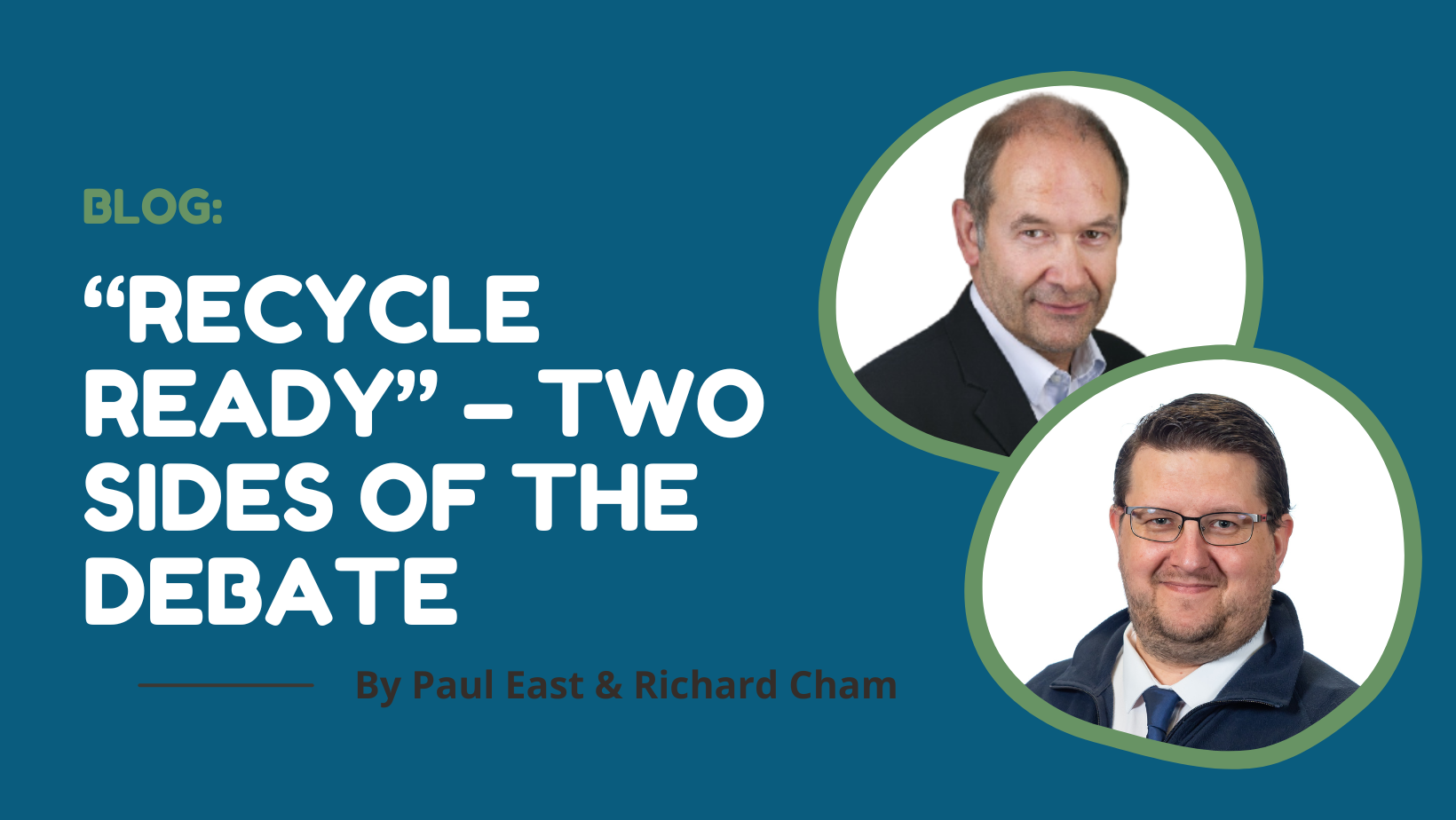Recycle Ready – Two Sides Of The Debate

Introduction
The recycling industry has many facets and therefore many opinions. While there are many aspects where the industry agrees; there are many more where disagreements happen. Even more when stakeholders from other industries are involved. But while this may make things challenging, healthy discussion keeps things moving.
RECOUP’s aim is to get industries talking to each other to reach a common goal. However, sometimes this ‘healthy discussion’ can include disagreements. All with the same goal in mind, but differences in the detail of how to go about it.
One example of this is the extent to which packaging manufacturers make claims concerning recyclability. The discussion below centres on the phrase ‘Recycle Ready’ which has been used by packaging manufacturers for a while.
A request to Packaging manufacturers and brand owners – please don’t stop at ‘recycle ready’
Paul East – Head of Packaging Recycling and Design
The term ‘Recycle Ready’ can be useful in industry discussions, for example pointing out packaging which has been changed from multi-material laminates to mono material. However, why then label the pack as ‘Recycle Ready’? This can be misleading and confusing to the consumer.
There have been many packaging formats placed on the market which use this phrase. Where the phrase is then used on-pack, this can contradict the disposal instructions given by local authorities for recycling from home. This is particularly the case with film and flexible materials that are not yet collected by all local authorities yet may still claim recyclability.
OPRL has changed it’s labelling, which is primarily a message to the consumer, to a binary system. This was because they recognised that too many options can lead to confusion. In my opinion, the same rules apply to labelling the pack as ‘Recycle Ready’.
The point is the public don’t want to know if it is Recycle Ready or not – just ‘can I recycle it’, and where. While we are trying to make recyclability and recyclability labelling easier to understand, additional labelling just adds more confusion.
So why should the communication between brand owners and other industries be any different? There is a danger that the term ‘Recycle Ready’ could be used to imply that the brand has done its ‘bit’, and the rest is up to the waste management industry. Relying on the recycling industry to make the changes required, without acknowledging the time and expense that this entails, is contrary to RECOUP’s aim, as mentioned in the introduction; to encourage stakeholders to talk to each other to reach a common goal.
We must ensure that innovation is not stifled. But why not target that innovation towards matching current recycling infrastructure? This way more packaging can be captured for recycling now.
Don’t stifle innovation by blacklisting ‘Recycle Ready’
Richard Cham – Technical Manager
While I agree with Paul to some degree on his stance on the term ‘Recycle Ready’, for me there are some situations when the phrase can be a good thing, in the right context. Take, for example, Capri-Sun with its recent roll-out of fully recyclable mono-PP pouches for their 200 ml juice drinks. Currently, with no flexible polypropylene recycling stream in the UK, it could be argued that these are ‘Recycle Ready’ in that they claim recyclability but place the burden of recycling on someone else making sure that this happens.
In reality, it is my opinion that in this context, announcements by companies such as Capri-Sun should be applauded. They have taken a multi-material, multi-layer, laminated pouch, which was not recyclable, and they have replaced it with something mono material that has a chance at being recycled. We know from the testing of the pouches and other mono format flexibles, that in the right facility they have the potential to be identified and sorted by near infrared (NIR) equipment at Material Recovery Facilities (MRF). One drawback with the 200 ml pouches is that they are flat and will end up with the 2D stream, where they are currently unlikely to be sorted into a flexibles stream.
However, skip forward to the year 2027 and suddenly the whole recycle ready argument begins to make sense. From March 2027, it will be mandatory for all local authorities in England to collect flexible packaging at the kerbside. This is likely to be the case across the majority of the UK. When this happens, Capri-Sun won’t be playing catch up, they have already taken the time to research thoroughly, test and develop a fully recyclable mono-PP pouch, that is ready for kerbside recycling collection.
Whilst it is important not to mislead customers with labels offering false promises, we must ensure that brands and packaging manufacturers are not scared of innovation. This is why it is important to think ahead with a ‘Recycle Ready’ mindset and test packaging formats, using companies like RECOUP. This will help to make sure that packaging designers and brands are taking the correct decisions and direction with regards to their packaging, making them more sustainable and recyclable in the future.